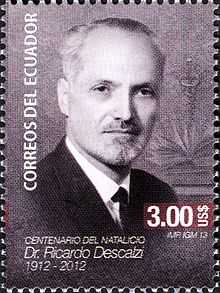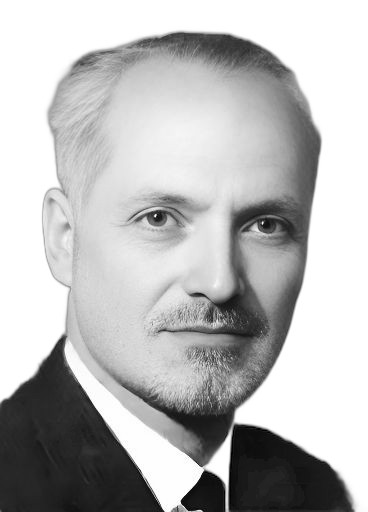Ricardo Descalzi del Castillo (Riobamba, September 22, 1912 – Riobamba, November 29, 1990) was an Ecuadorian novelist, historian, playwright, short story writer, translator, literary critic, university professor and medical doctor. In 1928, he founded the magazine Surcos with his Mejía National Institute classmates José Alfredo Llerena and Arturo Meneses. After graduating from high school in 1932, he published “Ghismondo,” a 100-page novel based on his experiences as a student. He also wrote the novel “Saloya” (1962), a short story collection “Los murmullos de Dios” (1959), and the stage plays “Los Caminos Blancos” (1939), “En el horizonte se alzó la niebla” (1961), and “El huasipungo de Andrés Chiliquinga” (1981). His six-volume “Historia crítica del teatro ecuatoriano” is perhaps his most important work (1968). Among his translations is “Poemas” (1969), a French-to-Spanish translation of poems by Nobel laureate Jean Poilvet Le Guenn. The Tobar Prize was bestowed upon him by the municipality of Quito in 1968. He was a member of the House of Ecuadorian Culture, the National Academy of History, and the Bolivarian Society of Quito, where he served as its vice president.
Introduction
Born on September 22, 1912, in Riobamba, Ecuador, Ricardo Descalzi del Castillo was a person of multifarious capabilities. He made an indelible mark as a novelist, historian, playwright, short story writer, translator, literary critic, university professor, and medical doctor. His contribution to various aspects of Ecuadorian culture and society is immensely diverse and profoundly influential.
Early Years and Education
Ricardo Descalzi was the son of Mario Descalzi Vignolo and María Isabel del Castillo Valencia. Tragically, his father died of pneumonia when he was just two years old. At six years old, Descalzi was sent to Guayaquil to study elementary school at the respected Santistevan School. He moved to Quito in 1926 to continue his high school education at the Mejía National Institute, where he graduated in 1932. Subsequently, he embarked on his medical studies, later graduating as a medical doctor and surgeon in 1941.
Literary Interest
As a teenager, Descalzi’s interest in literature began to blossom. In 1928, he, along with his classmates José Alfredo Llerena and Arturo Meneses, founded the magazine ‘Surcos’. The publication, although short-lived with only six issues, was an important incubator for Descalzi’s literary talents. He wrote his first novel, “Ghismondo”, a 100-page account based on his experiences as a student, immediately after graduating high school in 1932.
A Man of Multiple Talents
Ricardo Descalzi’s range of professional roles is a testament to his intellectual agility. He served as a medical doctor from 1941 until the mid-1960s, during which he held positions such as the head of Radiology at Solca, a medical institution. Descalzi furthered his medical expertise through oncology studies in Buenos Aires and Paris, revolutionizing cervical cancer detection in Quito with the introduction of the Papanicolaou test and biopsy techniques. His medical contributions also extend to his roles as a clinical and radiological assistant at Hospital Eugenio Espejo and his work in founding the Sociedad de Lucha contra el Cáncer (Society for the Fight Against Cancer) in 1948.
Simultaneously, Descalzi was also making significant contributions to the cultural and literary scenes of Ecuador. He served as the Director of the School of Fine Arts of Quito, the Head of Public Relations of the Central Bank of Ecuador, and later the Director of the National Library. His literary output was immense, producing novels such as “Saloya” (1962), short story collections like “Los murmullos de Dios” (1959), and several stage plays including “Los Caminos Blancos” (1939), “En el horizonte se alzó la niebla” (1961), and “El huasipungo de Andrés Chiliquinga” (1981). Among his notable translations is “Poemas” (1969), featuring poems by Nobel laureate Jean Poilvet Le Guenn, rendered from French to Spanish.
His seminal work is the six-volume “Historia crítica del teatro ecuatoriano” (1968), a critical history of Ecuadorian theater. This text, the first of its kind in Ecuador, offers a comprehensive understanding of the evolution and development of the country’s theatrical landscape.
Accolades and Affiliations
Descalzi’s literary and academic achievements were widely recognized. His play ‘Clamor de Sombras’ won the House of Ecuadorian Culture’s First Prize in Theater in 1950, and his novel ‘Saloya’ received the First Prize at the Central University in 1963. In 1968, the Tobar Prize was awarded to him by the Municipality of Quito in recognition of his literary contributions. In addition to these accolades, he held memberships in esteemed institutions, including the House of Ecuadorian Culture, the National Academy of History, and the Bolivarian Society of Quito, where he served as vice president.
Personal Life and Legacy
In 1941, Ricardo Descalzi married Olga Salgado Noboa, and the couple had six children. Throughout his life, Descalzi was an avid enthusiast of painting, music, and photography. He prepared a ‘History of Art in Ecuador’, supplementing it with his extensive personal collection of slides.
Descalzi died on November 29, 1990, in Riobamba, Ecuador, after a serious bout of coronary disease. However, his legacy lives on, having influenced multiple domains of Ecuadorian society. From medicine to literature, he demonstrated an exceptional ability to excel and innovate, and his works continue to be influential in Ecuadorian academic and literary circles.
Ricardo Descalzi del Castillo was more than just a writer, a historian, or a doctor; he was a symbol of Ecuadorian intellectual resilience and versatility. His life’s work is a testimony to his multifaceted genius, and his commitment to enhancing and uplifting the cultural and scientific domains of his beloved nation of Ecuador is a model of dedicated patriotism.
Pictures

Partial list of works
| Title | Genre | Year | Notes |
| Ghismondo | novel | 1932 | Read for free here. |
| Los Caminos Blancos | play | 1939 | |
| Anfiteatro: drama en tres actos y en prosa | play | 1950 | |
| Portovelo: Episodios de un campamento minero | history | 1951 | |
| Los murmullos de Dios | short stories | 1959 | |
| En el horizonte se alzó la niebla. Clamor de sombras | play | 1961 | Clamor de sombras was the winner of the House of Ecuadorian Culture’s First Prize in theater in 1950. |
| Saloya: novela de la montaña y el camino | novel | 1962 | Saloya was the winner of the Central University First Prize in 1963. |
| Historia crítica del teatro ecuatoriano | literary criticism/history | 1968 | |
| La Real Audiencia de Quito claustro en los Andes | history | 1978 | |
| El huasipungo de Andrés Chiliquinga: drama basado en la novela Huasipungo de Jorge Icaza | play | 1981 | |
| Cinco errores históricos de Quito | history | 1986 | |
| Síntesis histórico de la ciudad de San Pedro y San Pablo de Riobamba : estudio de sus fundaciones, nombres y ambiente colonial | history | 1987 | |
| Historia de las misiones amazonicas de la Real Audiencia de Quito | history | 1990 | |
| Historias de la Real Audiencia de Quito, Agua, higiene y medicina de la Quito colonial | history | 1990 | |
| Historias de la Real Audiencia de Quito Alzamientos y revoluciones en la colonia | history | 1990 | |
| Historias de la Real Audiencia de Quito Historia colonial de la Plaza Mayor (1990; history) | history | 1990 | |
| Historia de la Real Audiencia de Quito | history | 2010 |

